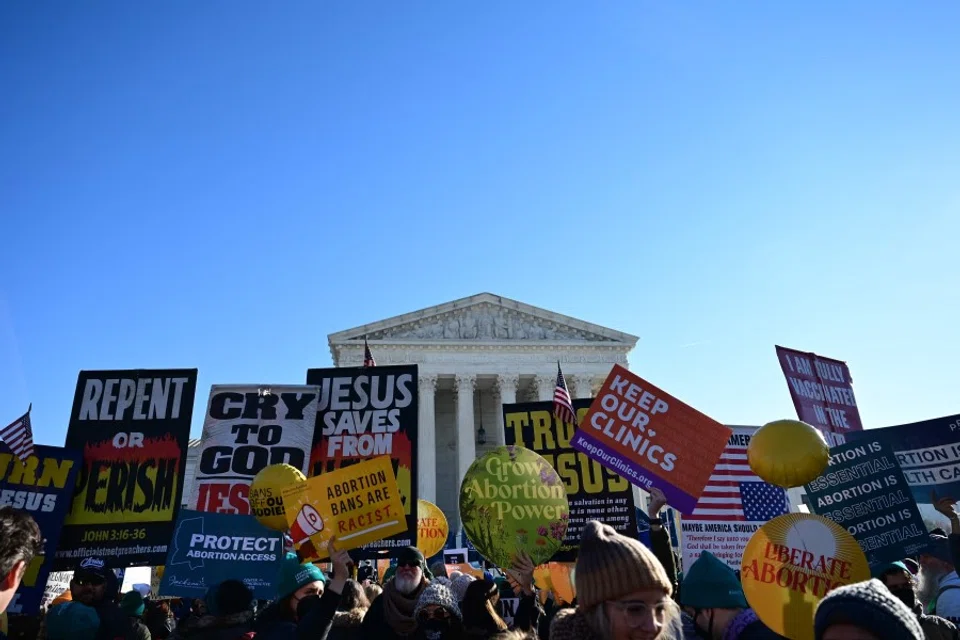Rise of Christian nationalism and its threat to US-China rivalry
A year on from the US Capitol attacks, Peter T.C. Chang reflects that the siege may have been the moment where America turned from championing "end of history" universalism to succumbing to "clash of civilisations" sectarianism. Worryingly, the rise of Christian nationalism could plunge America into internal turmoil and drag tense US-China geopolitical rivalry into uncharted waters.

The January 6 US Capitol attack in 2021 was an open assault on American democracy. But the Christian nationalistic sentiment unleashed during the Washington insurrection could also push US-China geopolitical rivalry into the dangerous "clash of civilisations" terrain.
Though deeply polarised, Americans are united in standing up to China.
A battle of ideals, within and without
At the outset, like any great power, the US is unlikely to cede its hegemony without a fight, as postulated by the Thucydides Trap. Yet unlike the Athens and Sparta power tussle, US-China rivalry is also a battle of ideals. America sees in China's rise an impediment to their "end of history" vision, that is to actualise a free, democratic world order.
But Americans have also become bitterly divided over their vision of the free world, with each seeing in the other a threat to their conflicting versions of the American way of life.
For the evangelicals, the endless cultural warfare over abortion, sexual orientation and gender identity, among other contentious issues, is symptomatic of a godless milieu mired in moral listlessness. To save America, the republic must return to its roots, namely, Christianity.
In the religious right judgment, America must pull up the drawbridge and restore its Christian heritage.

To be sure, it was enlightenment rather than theological ethos that inspired the founding fathers to turn America into a land of the free and a haven for many who fled religious persecution. But the big tent that sheltered multitudes is now overstretched. America's ever more diverse ethnoreligious landscape is losing social cohesion and the country is in danger of widespread civil strife.
In the religious right judgment, America must pull up the drawbridge and restore its Christian heritage. Or as Michael Flynn, former national security adviser in the Trump administration would have it: "If we're going to have one nation under God, which we must, we have to have one religion."
Dangerous stoking of Christian nationalistic sentiment
The September 11 attack on New York City, for many, validated Samuel Huntington's hypothesis that the flashpoints of post-Cold War conflicts would shift from ideological to civilisational fault lines. But the World Trade Centre tragedy galvanised a nation in shock as Americans rallied to reassert their commitment to the universal principles of liberty and fraternity, and to denounce religious extremism.
The January 6 assault of the US Capitol however has fractured the republic, shattering Americans' faith in Francis Fukuyama's "end of history" ideals. The Washington insurrection laid bare America's deepening ethnoreligious fissures, and political scientist Barbara F. Walter has warned that stoking Christian nationalistic sentiment could push America down the slope of religion-inspired violence.
One syndrome of an ailing US democracy is the drifting apart of Americans into their parallel universes of fact and fiction. QAnon falsehoods and conspiracy theories have infected the American body polity, crippling Washington's ability to govern through bipartisanship.
Amid an environmental crisis, raging pandemic and worsening social upheaval, some Christians are certain the world has entered a period of great tribulation.

Prophecies and miracles are staples of the world's diverse religions. Believers recognise an alternative reality that lies beyond the realm of reason in what they call "faith". In the modern world, religious people mostly kept their unverifiable theological beliefs private. And to the extent the supernatural does intervene in the natural order, the faithful believe these are acts of God that occur rarely and only in critical moments in history.
Evangelicals are convinced America is now at a moment of crisis and God is acting to save the republic from peril. And they believe Trump is the modern-day equivalent of the biblical figure King Cyrus (a heathen ruler chosen by God to save the Israelites), anointed to bring America back to God.
Amid an environmental crisis, raging pandemic and worsening social upheaval, some Christians are certain the world has entered a period of great tribulation. Reaction to the coronavirus, for instance, has become a test of faith, causing segments of the evangelical community to abandon science in favour of God as the ultimate healer.
China the new evil
In the conservative right-wing worldview, communist China is vilified as a godless regime, and the US-China conflict is grimly framed as a clash between good versus evil.
Of course, China is perceived as an existential threat by left-leaning Americans as well but for different reasons. Unlike conservative Republicans, Democrats see in an authoritarian China an imminent danger to their progressive, liberal American way of life.
Rebuffed by both conservatives and liberals, Beijing's estrangement with Washington has its share of conspiracy theory entanglements - the Wuhan lab leak controversy is one example. As the two superpowers' interactions become marred by misinformation and distrust, an escalating militarisation along the Taiwan Strait and in the South China Sea is raising the risk of miscalculation and accidental war.

Such is the concern that led Army General Mark Milley to secretly inform his Chinese counterpart that the outgoing Trump administration, riled by an election loss, has no plans to attack China. But America's political instability persists as Trump's "big lie" continues to hound Biden's presidency. According to the Washington Post-University of Maryland polls, one in three Americans now say violence against the government can be justified, citing fear of political schism and the pandemic.
The rise of Christian nationalism could nudge America towards the precipice of another Civil War and along with it drag an increasingly tense US-China geopolitical rivalry into uncharted waters.
Acceptance of violence is not without theological justifications. In Christian eschatology, the faithful must be combat-ready for all contingencies, including waging an apocalyptic battle between the forces of light and darkness.
Feeling under siege and unable to exact consequential change through the democratic process, radicals are issuing a war cry to defend the Christian way of life by all means necessary. Once a fringe entity, the far-right Christian militia has stormed the US Capitol to take centre stage.
Herein lies an ominous milepost of the January 6 insurrection. The Washington revolt may become remembered as the moment when America turns the page over from championing "end of history" universalism to succumbing to "clash of civilisation' sectarianism. The rise of Christian nationalism could nudge America towards the precipice of another Civil War and along with it drag an increasingly tense US-China geopolitical rivalry into uncharted waters.



![[Photos] Fact versus fiction: The portrayal of WWII anti-Japanese martyrs in Taiwan](https://cassette.sphdigital.com.sg/image/thinkchina/3494f8bd481870f7c65b881fd21a3fd733f573f23232376e39c532a2c7593cbc)

